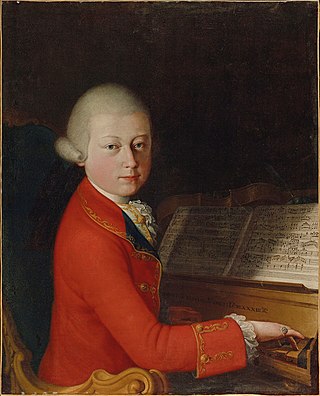Kyrie , also called Kyrie eleison, is the common name of an important prayer of Christian liturgy.
Contents
Kyrie may also refer to:
Kyrie , also called Kyrie eleison, is the common name of an important prayer of Christian liturgy.
Kyrie may also refer to:
Sehnsucht is a German noun translated as "longing", "yearning", or "craving".

The Requiem in D minor, K. 626, is a Requiem Mass by Wolfgang Amadeus Mozart (1756–1791). Mozart composed part of the Requiem in Vienna in late 1791, but it was unfinished at his death on 5 December the same year. A completed version dated 1792 by Franz Xaver Süssmayr was delivered to Count Franz von Walsegg, who had commissioned the piece for a requiem service on 14 February 1792 to commemorate the first anniversary of the death of his wife Anna at the age of 20 on 14 February 1791.
Gloria may refer to:

Amadeus is a 1984 American period biographical drama film directed by Miloš Forman, and adapted by Peter Shaffer from his 1979 stage play of the same name, in turn inspired by the 1830 play Mozart and Salieri by Alexander Pushkin. Set in Vienna, Austria, during the latter half of the 18th century, the film is a fictionalized story of Wolfgang Amadeus Mozart from the time he left Salzburg, described by its writer as a "fantasia on the theme of Mozart and Salieri". Mozart's music is heard extensively in the soundtrack. The film follows a fictional rivalry between Mozart and Italian composer Antonio Salieri at the court of Joseph II, Holy Roman Emperor. The film stars F. Murray Abraham as Salieri and Tom Hulce as Mozart. Abraham and Hulce were both nominated for the Academy Award for Best Actor, and Abraham won the award.
Fantasia may refer to:
Giovanni may refer to:
Miserere may refer to:
K–12 refers to primary and secondary education in the United States, Canada, and Australia.
Wolfgang is a German male given name.
K13 or K-13 may refer to:
Night music may refer to:
The Kyrie in F major, K. 33, is a sacred composition for choir and strings by a ten-year-old Wolfgang Amadeus Mozart, dated June 12, 1766. It was written while the composer was in Paris with his family, with the intent to promote his image as a child prodigy.
K33 or K-33 may refer to:

The Credo Mass in C major, K. 257, is a mass composed by Wolfgang Amadeus Mozart in 1776. It is scored for SATB soloists, SATB choir, violin I and II, 2 oboes, 2 clarini, 3 trombones colla parte and basso continuo.

The Missa brevis in D minor, K. 65/61a, is a mass composed by Wolfgang Amadeus Mozart and completed on 14 January 1769. It is scored for SATB soloists and choir, violin I and II, 3 trombones colla parte, and basso continuo.

Mozart's Mass in G major, K. 49/47d), is his first full mass. It is a missa brevis scored for SATB soloists and choir, violin I and II, viola, and basso continuo.
Mozart's Twelfth Mass is a commonly used title for a setting of the mass formerly attributed to Wolfgang Amadeus Mozart. Under this title, which was given to it by an English publisher, the piece attained great popularity in the 19th century and contributed to Mozart’s reputation. Today the piece is generally attributed to Wenzel Müller.
The Kyrie in D minor, K. 341/368a, is a sacred composition for choir and large classical orchestra by Wolfgang Amadeus Mozart. It is a setting of the Kyrie, the first section of the Mass, using an orchestra of two flutes, two oboes, two clarinets in A, two bassoons, two trumpets in D, four horns, two timpani in D and A, organ, and strings, as well as the chorus. It lasts approximately seven minutes in performance.
Amadeus most often refers to:

Mozart Mass K. 139 is a 45-minute classical studio album on which Mozart's Waisenhaus-Messe is performed by Gundula Janowitz. Frederica von Stade, Wiesław Ochman, Kurt Moll, the Chorus of the Vienna State Opera and the Vienna Philharmonic Orchestra under the direction of Claudio Abbado. It was released in 1976.